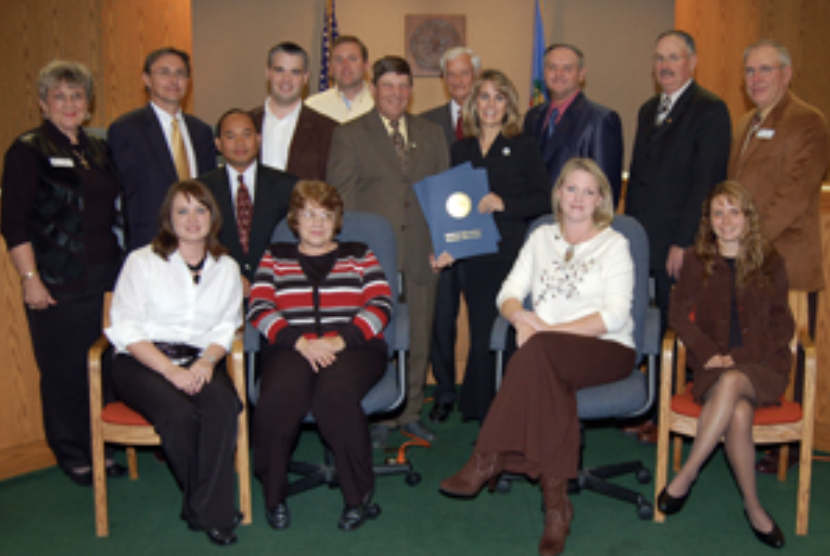Governor Henry and Oklahoma Conservation Commission Commend the Poteau River Watershed CSP Team
Governor Henry and the Conservation Commission recognized the Poteau River Watershed Conservation Security Program (CSP) Team at the November Commission meeting. The team members received a Governor’s Commendation presented on behalf of Gov. Brad Henry by Jeannette Nance, the Governor’s liaison to the Commission, and a Conservation Commission Commendation presented by OCC Chairman George Stunkard.

USDA Sec. of Agriculture Mike Johanns presented the Poteau River Watershed CDSP Team with the Award for Supporting the President’s Management Agenda and Civil Rights at the Secretary’s Honor Awards ceremony in Washington, D.C., on Oct. 20. The team was recognized “for outstanding outreach to the Conservation Security Program Native American, Asian, and limited resource customers in the Poteau River Watershed, Oklahoma, resulting in the most contracts accepted in the nation.”
The Poteau River Watershed CSP Team included the boards and staff of the Latimer County, LeFlore County and Haskell County Conservation Districts and Poteau, Stigler and Wilburton NRCS Field Offices. The team members are Phoukham Vongkhamdy (team leader), Justin S. Brown, Michael D. Bryan, Chris Cheatham, Shawn Fleming, James Harrison, Larry Hood, R. Artie Johnson, Daniel D. Lee, Robin L. Lynch, Tom Neumeyer, Ryan B. Pannell, Brent Reavis, H. Brian Ringels, Kenneth Risenhoover, Amanda Stanford, Rishell Tate, William Thomas, Sammy L. Viles, David B. Wells, Oscar B. Boyd, Brandon Faulkenberry, Kim Goff, Lisa Grey, Donna Hanebrink, and Nicole Norris.
CSP is a voluntary program administered by the USDA Natural Resources Conservation Service (NRCS). “The CSP supports ongoing conservation stewardship of agricultural working lands and provides incentives for even better conservation treatment of the land,” said Kenneth Risenhoover, NRCS district conservationist at Poteau. CSP provides annual payments for ten years to farmers and ranchers. Participants enter into a 10-year contract with NRCS and will receive annual payments based upon current and planned conservation work on their land.
For the Oklahoma portion of the Poteau River Watershed, 412 CSP contracts received approval. The majority of those (342) will be in LeFlore County, which contains the largest part of the watershed. “One reason we had an exceptional number of people qualifying for the program is the good job our producers have done over the past 20 years to establish good conservation programs on their land,” said Risenhoover.
“The CSP will not only help farmers and ranchers continue and add to their conservation programs, but it will be a boost to the local economy,” said Virginia Kidd, LeFlore County Conservation District director and member of the Oklahoma Conservation Commission. “Much of the annual payments to producers will be used to buy fertilizer, seed, and fuel, fencing materials, equipment, and pay contractors to build ponds and other practices. That means many people in the area other than just the producers will benefit from the program.”
“The work this team did is amazing,” said Dan Lowrance, president of the Oklahoma Association of Conservation Districts. “You expect a large signup for new programs like CSP in areas where producers have a long history of participating in USDA programs. In the Poteau River Watershed, however, this is the first time many of these landowners ever dealt with a federal agricultural program. When you take that into consideration and then see that this team signed up more producers than in any other area of the nation, their achievement becomes even more impressive.”
To participate in the program, producers completed a self-assessment of their operation to determine eligibility and then submitted an application to NRCS. NRCS determined program eligibility and the payment level producers qualified for. That level varies, depending on how many conservation practices they have completed among other factors. NRCS provides free technical assistance to producers through local conservation districts to install conservation practices and carry out conservation plans.
Other watersheds approved as CSP projects in Oklahoma this year are the Upper Beaver Creek Watershed in the panhandle and Spring Creek Watershed in the northeast part of the state. Texas and Cimarron Counties received approval for 27 contracts in the Upper Beaver Watershed. To date no contracts have been approved for the small portion of the Spring Creek Watershed that extends into northeast Oklahoma. CSP projects approved in prior years include the Lower Salt Fork River Watershed in the northern part of the state; Lower Cimarron River-Skeleton Creek Watershed in north-central part of the state; Little River Watershed in central Oklahoma, and the Lower Neosho River project in the northeastern part of the state.
